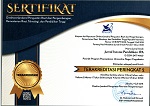Effectiveness of The Family Hope Program and Non-Cash Food Assistance in West Sulawesi Province
Abstract
Keywords
Full Text:
PDFReferences
Azhar, L. F., Badriah, L. S., & Bambang, B. (2020). Family Hope Program Evaluation in Poverty Alleviation: Benefit Incidence Analysis. Economics Development Analysis Journal, 9(1), 97-110. https://doi.org/10.15294/edaj.v9i1.38471
Bloch, C. (2020). Social Spending in South Asia-an Overview of Government Expenditure on Health. Retrieved from http://hdl.handle.net/10419/234891.
Central Bureau of Statistics. (2023). West Sulawesi BPS Socializes 2023 EPSS Results to the West Sulawesi EPSS Internal Assessment Team. Retrieved from https://sulbar.bps.go.id/.
Cunha, J. M. (2014). Testing Paternalism: Cash Versus in-Kind Transfers. American Economic Journal: Applied Economics, 6(2), 195-230.
Dann, C., Neumann, G., & Peters, J. (2014). Policy Evaluation with Temporal Differences: A Survey and Comparison. Journal of Machine Learning Research, 15(1), 809-883.
Daoud, J. I. (2018). Multicollinearity and Regression Analysis. Journal of Physics: Conference Series, 949(1), 1-7. https://doi.org/10.1088/1742-6596/949/1/012009
Dunn, A. (2023). Necessities Laid Bare: An Examination of Possible Justifications for Peter Townsend’s Purely Relative Definition of Poverty. Journal of Social Policy, 52(2), 237-255. https://doi.org/10.1017/S0047279421000532
Dunn, W. N. (2012). Problem Structuring in Policy Analysis. American Behavioral Scientist, 19(83), 1-33.
Firdausya, F. A., & Indawati, R. (2023). Perbandingan Uji Glejser dan Uji Park dalam Mendeteksi Heteroskedastisitas pada Angka Kematian Ibu di Provinsi Jawa Timur Tahun 2020. Jurnal Ners, 7(1), 793-796. https://doi.org/10.31004/jn.v7i1.14069
Ghufron, M. A., Saleh, M., Warsono, & Sofwan, A. (2016). A Model of Research Paper Writing Instructional Materials for Academic Writing Course: Needs & Documents Analysis and Model Design. English Language Teaching, 9(3), 1-12. https://doi.org/10.5539/elt.v9n3p1
Ginting, R., Noor, M., Widodo, S., & Istyaningsih, R. (2022). The Effectiveness of the Family Program (PKH) Management for Poverty Reduction in Karang Tempel Village, East Semarang District, Semarang City, Central Java, Indonesia. Advances in Social Sciences Research Journal, 9(7), 559-565. https://doi.org/10.14738/assrj.97.12635
Irmawati, Arafah, B., Abbas, H., & Ali, H. (2021). The Poverty Eradication Reflected in Ernest Miller Hemingway’s a Farewell to Arms. Struktural, 1(1), 1-10. https://doi.org/10.4108/eai.30-12-2020.2311280
Julianto, P. (2020). Implementasi Program Bantuan Pangan Non Tunai (BPNT) di Kecamatan Sitinjau Laut Kabupaten Kerinci. Qawwan: The Leader's Writing, 1(1), 38-43. https://doi.org/10.32939/qawwam.v1i1.77
Laurens, S., & Kusuma, A. H. P. (2020). Poverty Alleviation Efforts Through MDG’s and Economic Resources in Indonesia. Journal of Asian Finance, Economics and Business, 7(9), 755-767. https://doi.org/10.13106/JAFEB.2020.VOL7.NO9.755
Margono, B. A., Usman, A. B., Budiharto, & Sugardiman, R. A. (2016). Indonesia’s Forest Resource Monitoring. Indonesian Journal of Geography, 48(1), 7-20. https://doi.org/10.22146/ijg.12496
Marlian, S., Sumadinata, W. S., & Sari, D. S. (2021). The Evaluation of Policy Implementation on ASN Performance Appraisal System. Jurnal Manajemen Penanganan Publik, 4(2), 177-195. https://doi.org/10.24198/jmpp.v4i2.31048
Najidah, N., & Lestari, H. (2019). Efektivitas Program Keluarga Harapan (PKH) di Kelurahan Rowosari Kecamatan Tembalang Kota Semarang. Journal of Public Policy and Management Review, 8(2), 1-18.
Prasetyo, A., & Gartika, D. (2021). Spatial Economy Approach to Assess the Effectiveness of Poverty Treatment Policy Models and Regional Economic Impacts. IOP Conference Series: Earth and Environmental Science, 887(1), 1-11. https://doi.org/10.1088/1755-1315/887/1/012019
Republik Indonesia. (2004). Undang-Undang Republik Indonesia Nomor 24 Tahun 2004 tentang Lembaga Penjamin Simpanan. Lembaran Negara Republik Indonesia Tahun 2004 Nomor 96. Tambahan Lembaran Negara Republik Indonesia Nomor 4420.
Republik Indonesia. (2015). Peraturan Menteri Keuangan Republik Indonesia Nomor 254/PMK.05/2015 tentang Belanja Bantuan Sosial pada Kementerian Negara/Lembaga. Berita Negara Tahun 2015 Nomor 2047.
Sihotang, D., & Sihotang, M. M. (2022). Investigating the Transformative Impact of the Family Hope Program (PKH) on Basic Needs and Community Development in Pardomuan I Village, Pangururan District, Samosir Regency. Law and Economics, 16(1), 51-68. https://doi.org/10.35335/laweco.v16i1.51
Sugiharti, L., Purwono, R., Esquivias, M. A., & Jayanti, A. D. (2022). Poverty Dynamics in Indonesia: The Prevalence and Causes of Chronic Poverty. Journal of Population and Social Studies, 30(1), 423-447. https://doi.org/10.25133/JPSSv302022.025
Sugiyono. (2015). Metode Penelitian Kuantitatif, Kualitatif, dan R&D. Bandung: Alfabeta.
Suparno, Juri, & Relita, D. T. (2018). Implementasi Hak Warga Negara melalui Penanggulangan Kemiskinan Berperspektif Gender Program Keluarga Harapan terhadap Motivasi Belajar Anak Keluarga Penerima Manfaat di Kabupaten Sintang. Jurnal Ilmiah Pendidikan Pancasila dan Kewarganegaraan, 3(2), 196-206.
Swanwick, M. (1994). Observation as a Research Method. Nurse Researcher, 2(2), 4-12. https://doi.org/10.7748/nr.2.2.4.s2
Tandos, R. (2019). Re-designing Poverty Eradication Programs in Indonesia. Malaysian Journal of Social Sciences and Humanities, 4(1), 50-59.
DOI: http://dx.doi.org/10.17977/um019v9i3p%25p
Refbacks
- There are currently no refbacks.
Copyright (c) 2024 Jurnal Ilmiah Pendidikan Pancasila dan Kewarganegaraan

This work is licensed under a Creative Commons Attribution 4.0 International License.
View My Stats











